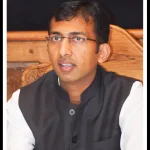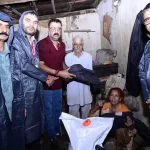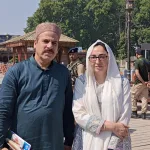SRINAGAR, NOV 22: In a significant move against the covert presence of individuals supporting terrorist activities within the government, the Jammu and Kashmir administration has terminated the services of four employees. This action is part of a broader initiative to dismantle the terrorist ecosystem that had infiltrated various levels of the government over the years.
Under Article 311 (2) (c) of the Constitution of India, the Union Territory administration has wielded its authority to dismiss more than 50 employees in the last three years. These individuals were found to be involved in aiding Pakistani terror outfits, facilitating logistics for terrorists, propagating terrorist ideologies, raising terror finances, and promoting secessionist agendas.
Among the terminated employees is Salam Rather, holding the position of ‘Laboratory Bearer’ in the Higher Education Department. Rather, who joined the government service in 1990, was revealed to have been actively supporting terror outfits like Hizbul Mujahideen (HM) in Kulgam district. His connections with the notorious Pakistani terrorist Habibullah Malik, also known as Sajid Jutt, were particularly troubling. Rather not only helped Jutt build an extensive network of supporters but also sheltered him in his home, facilitating his escape to Pakistan in 2005.
How employees within govt supported terrorism
Salam Rather, a lab bearer in the Higher Education Department, is accused of aiding terrorists in Kulgam district. Despite joining government service in 1990, Rather emerged as a powerful activist for terror outfits like Hizbul Mujahideen (HM) instead of fulfilling his duties.
During the late 1990s and early 2000s, Kulgam witnessed a surge in terrorist violence, with foreign Pakistani-origin terrorists establishing a stronghold. Rather reportedly formed connections with the notorious Pakistani terrorist Sajid Jutt, who later assumed leadership of LeT in the entire valley. Rather’s alleged collaboration with Jutt involved assisting in building an extensive network of supporters and recruiters. Under Jutt’s command, LeT carried out numerous attacks between 1998 and 2005.
Sources claim that Rather’s appointment in the Higher Education Department was solely based on his influential position in the secessionist-terrorist system. They suggest that he took advantage of the competitive separatist environment among regional parties. The relationship between Salam Rather and Sajid Jutt allegedly went beyond a typical association, with Rather reportedly offering his adopted daughter to Jutt for marriage.
Investigations reveal that Rather provided shelter to Jutt in his home and even constructed hideouts for him. Jutt escaped in 2005, and Rather is accused of facilitating his escape to Pakistan.
Sajid Jutt, a key figure in orchestrating terror attacks, established The Resistance Front (TRF) in collaboration with a killed terrorist commander. TRF poses a serious security challenge and is linked to numerous innocent killings in Kashmir.
Despite the grave accusations, Salam Rather reportedly maintains direct and indirect contact with Sajid Jutt through his daughter and the wife of Sajid Jutt. Rather has allegedly visited Pakistan twice.
Sources emphasise the urgency of investigating this alleged nexus, highlighting potential national security implications. The revelations shed light on the intricate web of relationships within the secessionist-terrorist system and its infiltration into government institutions.
Dr Nisar Ul Hassan, Assistant Professor, Medicine at SMHS Hospital, Srinagar: Dr Nisar Ul Hassan was appointed as a consultant medicine, SMHS Hospital. He has been working as Assistant Professor, Medicine at SMHS Hospital, Srinagar and is a self-styled president of Doctors Association of Kashmir (DAK) for last 8 years though he has never participated in DAK elections. Credible reports suggest that President DAK Dr Mohammad Yusuf Tak has communicated in writing to Divisional Commissioner Kashmir questioning the locus standi of Dr Nisar in representing DAK before media and public. Dr Nisar, by misusing and exploiting his official position has always tried to maintain his dominance in the public sphere by indulging in the secessionist activities in flagrant violation of service rules as well as the security of the state. He has established himself as a staunch separatist and would consistently provide moral and background support to secessionists and terrorists within Kashmir. He used to participate in the meetings/seminars organized by separatist organizations.
Sources said Dr. Nisar under the patronage of Pakistani proxies operating in J&K, while maintaining his association with the medical field has been continuously fuelling and furthering separatist ideology within the medical professionals of J&K.
He clearly propagates a highly vicious ideology that so long Kashmir is part of India, nothing good can happen in Kashmir. In an incident, where four terrorists were killed by security forces when they attacked CRPF camp at Gagren, Shopian in 2013, Dr. Nisar brazenly provoked and incited people to come in support of ‘terrorists’ by labelling the terrorists as ‘mujahids’ and branded them to have been fighting for the noble cause of so-called freedom of Kashmir from India,” sources said.
Investigation has further unearthed that Dr Nisar in May 2014, post parliamentary elections, issued a statement published in a local daily that irrespective of the government at Delhi whether it is Congress or BJP, the colonial attitude of government of India will continue. In the article, he has said that Kashmir is will continue their ‘freedom struggle’. Again in May 2014, Dr Nisar issued an article in Kashmir Today where he glamorized terrorism by exhorting the youth of Kashmir to sacrifice themselves for the noble cause of freedom. He termed terrorists as real heroes fighting for the just cause against India. The statement categorically is an incitement and provocation to youth of J&K to join terrorist ranks. He even called for donations in favour of families of terrorist and secessionist to sustain the freedom movement. He has acted as a de-facto spokesperson of the proscribed terrorist organizations, who has played a significant role in sustaining the funding of terrorist organizations’ by resorting to such appeals before public. He issued another statement in a local daily that doctors will provide free of cost treatment to all the victims of oppression as their duty towards freedom movement. He has asked for institutionalisation of the ‘freedom movement’ which is nothing but to secede J&K from Union of India by both by armed and unarmed means; so that people from all the walks of life could come under one banner in the so called freedom struggle. In November 2014 in his statement in another local daily, he said that Kashmir wants freedom from India.
Another source confirmed that in 2015, when he was suspended by the then government, all the separatist leaders including Syed Ali Shah Geelani and Yasin Malik etc. came in his support.
“This support from a separatist camp, involved in a series of secessionist and terrorism related cases, reflects on the criminal stature of Dr Nisar within terrorist-secessionist network spread across J&K. The statements that came in support of him were published in a local daily on April, 2015. He has been instrumental in systemic radicalization of youth of Kashmir through his blatant statements,” the source said.
An officer said that in the past two decades, Dr. Nisar has been spearheading secessionism brazenly and unabatedly. He said that this was all because of the tacit and active support from Pakistan and its proxies working in Kashmir.
“The system and particularly the medical institutions of J&K were so much hijacked that no-one would dare to express the truth that he, was and is, a Pakistani stooge who continues working in medical profession in Kashmir and is fed on Indian money which he uses for spreading anti-India narrative within and outside Kashmir and serves the secessionist-terrorist network controlled and operated from Pakistan.
Dr Nisar had a clear mission mandated from across and was instructed to orient the medical professionals in J&K, towards secessionism against India, sources revealed.
Abdul Majeed Bhat, Constable, JKP:
Abdul Majeed Bhat, a constable in the Jammu and Kashmir Police, has been unmasked as a key player in an organized narcotics syndicate operating in the Kupwara area. Bhat, initially appointed as a Special Police Officer (SPO) in 2011 and later confirmed as a Constable in 2016, utilised his official position and connections to not only survive but thrive in the drug trade for more than a decade.
Investigations have uncovered Bhat’s involvement in a lucrative narcotics enterprise, where he not only clandestinely peddled drugs under the cover of his police uniform but also leaked criminally sensitive information to associates within and outside the police department. In a major drug bust in 2022, the police recovered 1.85 kg of heroin worth several crore, exposing the deep-rooted involvement of Bhat and other police personnel in drug peddling activities.
The evidences collected in the case have pointed to Bhat’s role in collecting narcotics from associates operating in border areas of Uri, who sourced the drugs from across the border in Pakistan through Hizbul Mujahideen (HM) terrorist handler Shakir Khan. The investigation has established that Bhat not only facilitated drug addiction among innocent youth but also procured and sold narcotics sent from Pakistan for personal gains.
Of significant concern is the direct link between the narcotics trade and terrorism financing in the region. Shakir Khan, an ex-filtrated terrorist of the HM organization, has been using narcotics consignments to fund the proscribed HM’s terrorist activities in Jammu and Kashmir. As a member of the cross-LOC narco-terror syndicate, Bhat played a crucial role in contributing to the funding of terrorism by receiving and selling smuggled narcotics sent by HM terrorists in Pakistan.
The modus operandi revealed during the investigation indicates that the proceeds from narcotics sales in J&K are being sent to Pakistan through cash transfers across the border. This money is then channelled by Pakistan-based terrorist handlers to finance terrorism in J&K, further exacerbating the security threat in the region.
The direct correlation between narcotics trafficking and terrorism underscores the gravity of the situation, with Bhat’s betrayal of his uniform and duty resulting in the compromise of national security. His actions not only squandered public resources but also undermined the efforts of the police department, which invested time and resources in training an individual who ultimately turned out to be a criminal working against the interests of the country.
Farooq Ahmad Mir, Teacher: Farooq Ahmad Mir, initially appointed in the Education Department in 1994 and later promoted to a teaching position in 2007, has a controversial history linked to terrorism. Investigations suggest that Mir gained prominence as a supporter of the banned Jamat-e-Islami (JeI) and joined active terrorism in 1990.
Mir, allegedly trained in a terrorist camp in Pakistan, later became a top commander of the Hizbul Mujahideen terror outfit. Arrested in 1991, he spent two years in detention before being released in 1993. Despite his past, Mir managed to secure a position as a Class-IV employee in the Education Department, raising questions about the selection process.
Mir, with significant influence in the secessionist-terrorist ecosystem, reportedly used his position to instil fear and exert power. Sources reveal that thousands with affiliations to such groups were appointed in government services, disregarding established norms.
Mir, after joining the government, openly embraced and advocated for secessionist ideology. He played a senior role in the Tehreek-e-Hurriyat (TeH) organisation, coordinating and organizing events. In 2009, a criminal case was registered against him for inciting violence and promoting terrorism.
Mir’s involvement in the 2008 Amarnath land row agitation and the 2016 post-Burhan Wani killing violent agitation is highlighted. He allegedly incited mobs, leading to loss of human lives and extensive property damage.
Despite being detained under the Public Safety Act (PSA) and arrested multiple times, no disciplinary action was taken against Mir by the department. He was never marked absent and was paid a full salary even during his six-month jail term.
Mir’s influence within the High Court Bar Association Srinagar reportedly led to the quashing of his PSA detention in 2011, allowing him to resume his secessionist activities.
Mir, with a history of alleged terrorist involvement, continues to raise concerns about the penetration of adversarial elements within the government system.
Quotes from undisclosed sources reveal the extent of his influence and the apparent lack of accountability within the government.





